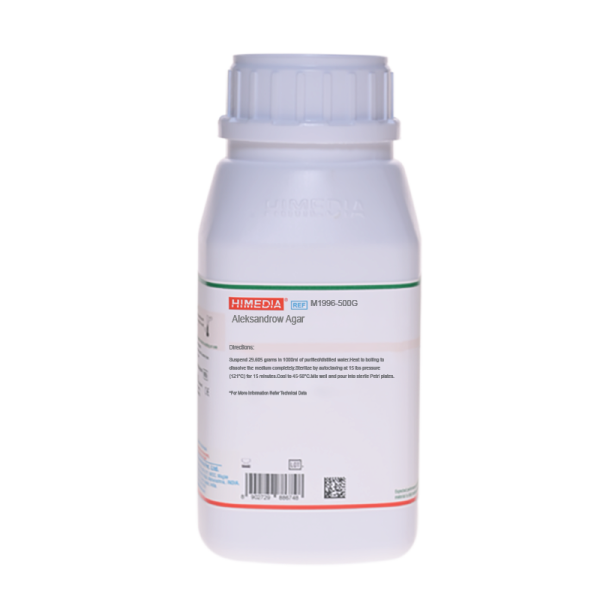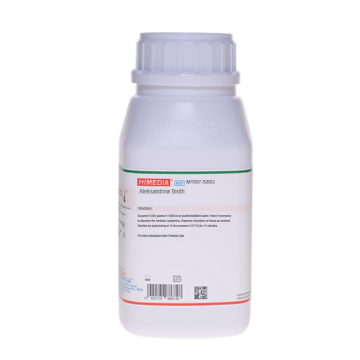 Your enquiry has been submitted
Your enquiry has been submitted
Aleksandrow Agar
Intended Use
Recommended for isolation and detection of Potassium solubilizing bacteria from soil samples.
Composition**
| Ingredients | Gms / Litre |
|---|---|
| Magnesium sulphate | 0.500 |
| Calcium carbonate | 0.100 |
| Potassium alumino silicate | 2.000 |
| Dextrose (Glucose) | 5.000 |
| Ferric chloride | 0.005 |
| Calcium phosphate | 2.000 |
| Agar | 20.000 |
Final pH ( at 25°C): 7.2±0.2
**Formula adjusted, standardized to suit performance parameters
Directions
Suspend 29.60 grams in 1000ml of purified / distilled water. Heat to boiling to dissolve the medium completely. Sterilize by autoclaving at 15 lbs pressure (121°C) for 15 minutes. Cool to 45-50°C. Mix well and pour into sterile Petri plates.
Principle And Interpretation
Soil potassium supplementation relies heavily on the use of chemical fertilizer, which has a considerable negative impact on the environment. Potassium-solubilizing bacteria convert insoluble potassium in the soil into a form that plants can access. A wide range of bacteria namely Pseudomonas, Burkholderia, Acidothiobacillus ferrooxidans, Bacillus mucilaginosus, Bacillus edaphicus, B.circulans and Paenibacillus sp. has been reported to release potassium in accessible form from potassium bearing minerals in soils (6). Potassium-solubilizing bacteria have been reported to exert beneficial effects on growth of cotton, pepper and cucumber(3), sorghum(1), wheat(7) and Sudan grass(2). Therefore potassium solubilizing bacteria are extensively used as biofertilizers.
Salts present in the medium support the growth of potassium solubilizing bacteria by providing the essential nutrients. The source of potassium salts is potassium alumino silicates. Potassium solubilizing bacteria will grow on this medium and form a clear zone around the colony, formed due to potassium solubilization in the vicinity of the colony.
Type of specimen
Soil sample.
Specimen Collection and Handling
For soil samples, follow appropriate techniques for sample collection, processing as per guidelines and local standards.(8) After use, contaminated materials must be sterilized by autoclaving before discarding.
Warning and Precautions
Read the label before opening the container. Wear protective gloves/protective clothing/eye protection/ face protection. Follow good microbiological lab practices while handling specimens and culture. Standard precautions as per established guidelines should be followed while handling clinical specimens. Safety guidelines may be referred in individual safety data sheets.
Limitations
- Due to nutritional variation, certain strains may show poor growth.
Performance and Evaluation
Performance of the medium is expected when used as per the direction on the label within the expiry period when stored at recommended temperature.
Quality Control
Appearance: Cream to yellow homogeneous free flowing powder
Gelling: Firm, comparable with 2.0% Agar gel
Colour and Clarity of prepared medium: Cream to light yellow coloured opaque gel with white precipitate forms in Petri plates
Reaction: Reaction of 2.96% w/v aqueous solution at 25°C. pH : 7.2±0.2
pH: 7.00-7.40
Cultural Response: Cultural characteristics observed after an incubation at 35-37°C for 24-48 hours.
| Organism | Inoculum (CFU) | Growth | Potassium solubilization |
|---|---|---|---|
| Potassium solubilizing isolate | 50-100 | good-luxuriant | positive reaction, clear zone surrounding the colony |
Storage and Shelf Life
Store between 10-30°C in a tightly closed container and the prepared medium at 20-30°C. Use before expiry date on the label. On opening, product should be properly stored dry, after tightly capping the bottle in order to prevent lump formation due to the hygroscopic nature of the product. Improper storage of the product may lead to lump formation. Store in dry ventilated area protected from extremes of temperature and sources of ignition Seal the container tightly after use. Product performance is best if used within stated expiry period.
Disposal
User must ensure safe disposal by autoclaving and/or incineration of used or unusable preparations of this product. Follow established laboratory procedures in disposing of infectious materials and material that comes into contact with sample must be decontaminated and disposed of in accordance with current laboratory techniques (4,5).
Reference
- Badr, M .A., Shafei, A.M . and Sharaf, S.H. El-Deen, 2006, The dissolution of K and phosphorus bearing minerals by silicate dissolving bacteria and their effect on sorghum growth. Research Journal of Agriculture and Biological Sciences, 2, 5-11.
- Basak, B.B. and Biswas, D.R., 2008, Influence of potassium solubilizing microorganism (Bacillus mucilaginous) and waste mica on potassium uptake dynamics by sudan grass( Sorghum vulgare Pers) grown under two Alfisols. Plant Soil, 317, 235-255
- Han, H.S., Supanjani and Lee, K.D., 2006, Effect of co-inoculation with phosphate and potassium solubilizing bacteria on mineral uptake and growth of pepper and cucumber. Plant Soil and Environment, 52, 130-136.
- Isenberg, H.D. Clinical Microbiology Procedures Handbook 2nd Edition.
- Jorgensen, J.H., Pfaller, M.A., Carroll, K.C., Funke, G., Landry, M.L., Richter, S.S and Warnock., D.W. (2015) Manual of Clinical Microbiology, 11th Edition. Vol. 1.
- Sheng, X.F., 2005, Growth promotion and increased potassium uptake of cotton and rape by a potassium releasing strain of Bacillus edaphicus. Soil Biology and Biochemistry, 37, 1918-1922
- Sheng, X.F. and He, L.Y., 2006, Solubilization of potassium bearing minerals by a wild type strain of Bacillus edaphicus and its mutants and increased potassium uptake by wheat. Canadian Journal of Microbiology, 52, 66-72.
- Subba Rao, 1977, Soil Microorganisms and Plant Growth, Oxford and IBH Publishing Co., India.
| Product Name | Aleksandrow Agar |
|---|---|
| SKU | M1996 |
| Product Type | Regular |
| Physical Form | Powder |
| Origin | Chemically defined |
| Packaging type | HDPE |
| References | 1.Sheng, X.F., 2005, Growth promotion and increased potassium uptake of cotton and rape by a potassium releasing strainof Bacillus edaphicus . Soil Biology and Biochemistry, 37, 1918-19222.Han, H.S., Supanjani and Lee, K.D., 2006, Effect of co-inoculation with phosphate and potassium solubilizing bacteria onmineral uptake and growth of pepper and cucumber. Plant Soil and Environment, 52, 130-13 |
| Customized Product Available | No |





